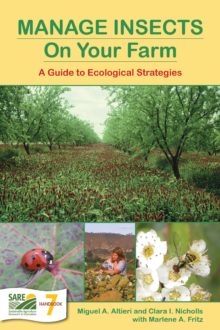Beneficial Agents on the Farm
Introduction
Biological control is the use of natural enemies to manage pests. The natural enemy might be a predator, parasite, or disease that will attack the insect pest. Biological control is a form of enhancing natural defenses to achieve a desired effect. It usually involves raising and releasing one insect to have it attack another, almost like a “living insecticide.” You can facilitate a biological control program by timing pesticide applications or choosing pesticides that will be least harmful to beneficial insects.
A durable biological control program depends on two main strategies:
1) Using ecological farm design to make your farm more attractive to biological control “agents.”
2) Introducing beneficial agents onto your farm.
When plant pathogens are not inhibited by naturally occurring enemies, you can improve biocontrol by adding more effective beneficials. Such “directed biocontrol” operates in several ways. As naturally occurring enemies would do, introduced beneficials may:
- produce antibiotics
- parasitize target organisms
- form physical or chemical barriers to infection
- outcompete plant pathogens for niches
- simply help the plant grow better, masking symptoms where disease is present.
